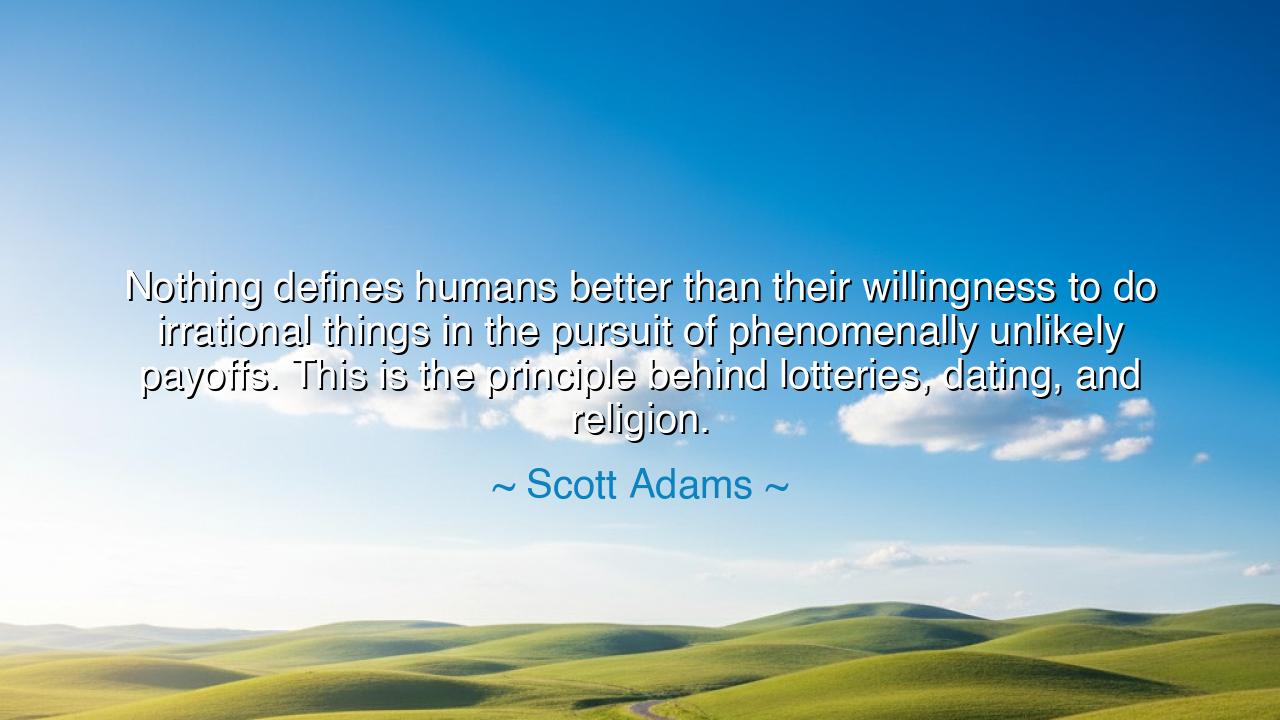
Nothing defines humans better than their willingness to do
Nothing defines humans better than their willingness to do irrational things in the pursuit of phenomenally unlikely payoffs. This is the principle behind lotteries, dating, and religion.






When Scott Adams said, “Nothing defines humans better than their willingness to do irrational things in the pursuit of phenomenally unlikely payoffs. This is the principle behind lotteries, dating, and religion,” he did not merely jest about the follies of humankind — he revealed one of the most paradoxical and profound truths of existence: that the human spirit is both irrational and divine. In those few words lies the tension that has driven civilizations to greatness and ruin alike — the audacity to dream beyond reason, to act not because success is certain, but because hope commands it. Adams, a satirist of modern ambition, spoke with irony, yet behind the laughter stands an ancient truth: that faith in the improbable is the root of all creation.
For what is it to be human if not to hope against odds? The beasts act by instinct; the wise machines of our age act by logic. But the human being — fragile, uncertain, aware of death — acts by belief. Whether one buys a lottery ticket, falls in love, or lifts their eyes to heaven, each act defies probability. The chance of winning riches, the risk of heartbreak, the mystery of the divine — all are uncertain, all are, by reason’s measure, foolish. Yet humanity persists. Adams calls this irrationality, but it is also the seed of transcendence. Without it, no one would create, no one would venture, no one would love. Rationality builds walls of safety; irrationality builds bridges to the impossible.
The lottery, which Adams names first, is the purest symbol of this phenomenon — the worship of chance itself. Millions cast their coins into the urn of fortune, knowing the odds defy them. Yet they dream. To the cynic, it is foolishness; to the philosopher, it is faith in motion. The poor man buying a ticket does not merely chase gold — he reaches for a moment of possibility, a glimpse of life beyond his limits. The act is not about numbers, but about imagination — the courage to believe that fate might, just once, smile upon him. It is the same courage that made the peasant leave his field to seek glory, or the sailor launch his ship into uncharted seas. To act irrationally is, in truth, to refuse despair.
The second realm Adams names is love — the most glorious irrationality of all. Who among mortals can calculate the madness of the heart? Lovers risk rejection, betrayal, and ruin, yet they come again and again to the altar of affection. The philosopher may call it folly, but without this folly, humanity would wither. For love is the irrational leap that binds generations, that builds homes, that births both joy and sorrow — the twin fires of life itself. Consider Antony and Cleopatra, whose love defied empires and reason alike. They destroyed kingdoms for passion, and though history calls them foolish, their story lives while their conquerors are dust. Such is the power of irrational desire: it perishes, yet becomes eternal.
And then Adams speaks of religion, the oldest and grandest of all human wagers. The faithful kneel before mysteries they cannot prove, trusting in powers they cannot see. To the skeptic, it is madness — to pray to unseen gods, to offer time, devotion, and even life itself for the promise of eternity. Yet it is this very madness that has shaped the world. Cathedrals rise because of faith, not certainty; martyrs die because of conviction, not evidence. The irrational pursuit of divine connection has given birth to both beauty and cruelty, yet through it all, it reveals something deeper: that humanity cannot live by reason alone. The spirit demands meaning, and meaning requires risk.
From lotteries to love, from prayer to purpose, Adams’ words unveil the strange engine of the human condition — our need to reach beyond logic toward wonder. Rational beings would live safely, but shallowly. It is our irrational hope, our willingness to dream beyond likelihood, that lifts us from survival to creation. Every great discovery, every work of art, every revolution begins as a folly — an impossible idea dared into existence. The Wright brothers defied gravity; explorers defied oceans; poets defied silence. All were irrational until they succeeded. Thus, Adams’ irony hides a compliment: that to be human is to gamble gloriously with the impossible.
But his wisdom also warns us. The same fire that drives greatness can burn into delusion. The gambler who spends his life on luck, the lover who loses themselves in obsession, the zealot who turns faith into hatred — these are shadows of the same irrational flame. The lesson, then, is not to extinguish our irrational nature, but to temper it with awareness. The ancients would say: let reason hold the reins, but let passion drive the chariot. One must dream, but not drown in the dream.
So, O seeker of meaning, take heed of Scott Adams’ paradoxical truth: our greatest power lies not in logic, but in our defiance of it. The world belongs to those who dare to hope when reason says there is none. Yet walk wisely — do not mistake delusion for destiny, nor comfort for courage. Dream boldly, but steer your dreams with understanding. For the miracle of being human is this: that we are creatures of both folly and faith, and it is through our irrational pursuit of the improbable that we make the impossible real.






AAdministratorAdministrator
Welcome, honored guests. Please leave a comment, we will respond soon